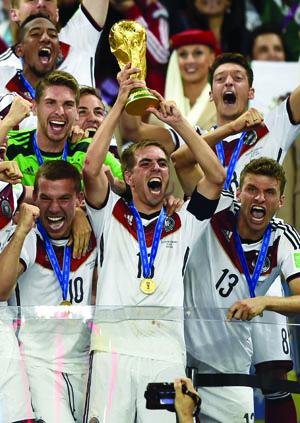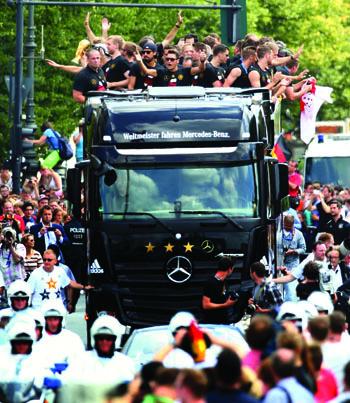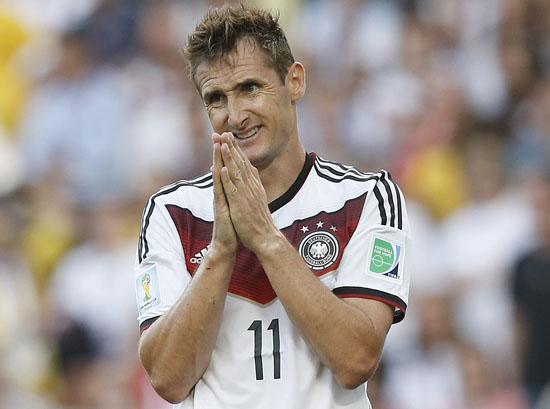You are here
Germany basks in 4th World Cup after 24-year wait
By AP - Jul 14,2014 - Last updated at Jul 14,2014

BERLIN/RIO DE JANEIRO — It’s been a long wait, and now Germany is basking in its fourth World Cup title.
The Die Welt newspaper celebrated Monday with a three-word headline in the national colours of black, red and gold that read simply: “It is true,” while Der Spiegel magazine’s website listed Germany’s titles: “1954. 1974. 1990. 2014!”
Midfielder Mario Goetze, who wasn’t born when Germany won its last World Cup, sealed the title with his extra-time goal. “THANK GOETZ! World champions!” screamed the mass-circulation daily Bild.
“Super Mario gets the fourth star!” read the headline in Berlin tabloid Berliner Kurier.
German astronaut Alexander Gerst congratulated the team from the International Space Station on its “top performance”. He tweeted a picture of himself in a Germany jersey with an extra fourth star — “as experts on stars, we already got one”.
Germany goalkeeper Manuel Neuer said after the match: “All of Germany is the world champion.”
The theme was picked up by a top official in Chancellor Angela Merkel’s party, Peter Tauber, who tweeted, “Good morning, you world champions out there!”
Merkel and President Joachim Gauck, who travelled together to the final in Rio de Janeiro, posed for pictures with the team and the trophy. And there was another selfie with a beaming chancellor for forward Lukas Podolski, weeks after Merkel dropped into the dressing room during a visit to Germany’s opening match.
It’s Germany’s first World Cup title as a reunited nation, though that fact drew barely any attention in German media. West Germany’s 1990 win came with the country just three months away from reunification; united Germany won the 1996 European Championship.
About a quarter of a million fans celebrated into the night at the packed “fan mile” in front of Berlin’s Brandenburg Gate, while car drivers blasted their horns into the early hours of the morning.
The party resumes on Tuesday morning, when coach Joachim Loew’s team is due to land at Berlin’s Tegel airport and then celebrate its triumph at the Brandenburg Gate.
The finance ministry said it will issue a special “Germany World Cup champion” postage stamp. But don’t expect Germany to declare a national holiday in celebration.
“There is no serious discussion of this,” government spokeswoman Christiane Wirtz said.
United as one
United they stand, right at the top of the football world.
And right on South American soil.
Germany won its fourth title, but its first since a country torn apart by political divisions at the end of World War II was finally glued back together.
“It was always my dream to get on the summit and look down,” said Miroslav Klose, a Polish-born Germany striker who is a perfect example of the country’s unification and its diversity. “Incredible.”
The Germany victory at the iconic Maracana Stadium was special for another reason, too. The Germans became the first European team to win a World Cup in the Americas, coming after they humiliated host Brazil 7-1 in the semifinals and then got the best of Argentina and Lionel Messi 1-0 in the final.
Along the way, Klose set the record for World Cup goals, scoring his 16th in the rout over Brazil to push himself ahead of Brazil striker Ronaldo.
Klose didn’t score on Sunday at the Maracana, however. Instead, it was the man who replaced him in the 88th minute, Mario Goetze, that did.
Goetze’s moment of brilliance, chesting the ball to control it and then volleying past Argentina goalkeeper Sergio Romero deep in extra time, was just another sample of the teamwork that has lifted this tightly knit Germany setup to the top.
“The team did it beautifully,” said Manuel Neuer, voted the best goalkeeper of the tournament. “At some point we’ll stop celebrating, but we’ll still wake up with a smile.”
After winning the World Cup title in 1954, West Germany turned itself into a powerhouse on the field. The west side of the divided nation later won the 1972 European Championship and then the 1974 World Cup, playing as the host.
Another European title came in 1980, followed a loss to Italy in the 1982 World Cup final. The West Germans again reached the final in 1986, but lost to an Argentina team led by Diego Maradona in Mexico. They got their revenge four years later, beating the Argentines in 1990 to win the World Cup for a third time.
Their lone major title as a united country came at Euro 96, when they beat the Czech Republic in the final at another of football’s grandest venues, Wembley Stadium. But they have come very close many times since, losing to Brazil in the 2002 final and reaching the semifinals in both 2006 and 2010.
Argentina has now come up short against Germany in three straight World Cups. The Argentines also lost to the Germans in the quarter-finals at the last two tournaments.
“This was our chance, and we felt that way,” said Argentina midfielder Javier Mascherano, perhaps the team’s most important player behind Messi. “We couldn’t do it. We have to lift our head and suffer the pain.”
For Brazilian fans, still hurting after the drubbing by Germany and still sad about the broken back that ruled Neymar out of the final games of the World Cup, Sunday’s result comes with a sigh of relief.
The five-time champions have now hosted the World Cup twice, and come up short both times. In 1950, Brazil lost to Uruguay in the final match, forever known around here as the Maracanazo. This year, after getting trounced by Germany, many Brazilians believed a win for Argentina, Brazil’s biggest rival, would have hurt almost as much.
Germany, by way of Goetze’s goal in the 113th minute, took care of that problem.
“You just shoot that goal in, you don’t really know what’s happening,” Goetze said. “And then at the end of the match, having a party with the team, the whole country... it is for us, a dream come true.”
This time, it’s for all Germans.
Related Articles
About a million jubilant Germans welcomed their triumphant national football team home to Berlin on Tuesday, many waving flags and banners saying “We are all World Champions!” as they basked in the nation’s fourth World Cup victory.
Germany striker Miroslav Klose, who capped a record-breaking career with the national team by winning the World Cup last month, has retired from international football.
World champions Germany will be desperate to bounce back with home win over Ireland next week to recover from a shock 2-0 defeat to Poland in their Euro 2016 qualifier on Saturday but in order to achieve that, they need to start scoring goals.













